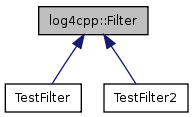#include <Filter.hh>

Public Types | |
| enum | Decision { DENY = -1, NEUTRAL = 0, ACCEPT = 1 } |
Public Member Functions | |
| virtual void | appendChainedFilter (Filter *filter) |
| virtual Decision | decide (const LoggingEvent &event) |
| Filter () | |
| virtual Filter * | getChainedFilter () |
| virtual Filter * | getEndOfChain () |
| virtual void | setChainedFilter (Filter *filter) |
| virtual | ~Filter () |
Protected Member Functions | |
| virtual Decision | _decide (const LoggingEvent &event)=0 |
Private Attributes | |
| Filter * | _chainedFilter |
Users should extend this class to implement customized logging event filtering. Note that log4cpp::Category and lof4cpp::Appender have built-in filtering rules. It is suggested that you first use and understand the built-in rules before rushing to write your own custom filters.
This abstract class assumes and also imposes that filters be organized in a linear chain. The decide(LoggingEvent) method of each filter is called sequentially, in the order of their addition to the chain.
The decide(LoggingEvent) method must return a Decision value, either DENY, NEUTRAL or ACCCEPT.
If the value DENY is returned, then the log event is dropped immediately without consulting with the remaining filters.
If the value NEUTRAL is returned, then the next filter in the chain is consulted. If there are no more filters in the chain, then the log event is logged. Thus, in the presence of no filters, the default behaviour is to log all logging events.
If the value ACCEPT is returned, then the log event is logged without consulting the remaining filters.
The philosophy of log4cpp filters is largely inspired from the Linux ipchains.
Definition at line 49 of file Filter.hh.
| log4cpp::Filter::Filter | ( | ) |
Default Constructor for Filter
Definition at line 15 of file Filter.cpp.
| log4cpp::Filter::~Filter | ( | ) | [virtual] |
Destructor for Filter
Definition at line 19 of file Filter.cpp.
| virtual Decision log4cpp::Filter::_decide | ( | const LoggingEvent & | event | ) | [protected, pure virtual] |
Decide whether this Filter accepts or denies the given LoggingEvent. Actual implementation of Filter should override this method and not decide(LoggingEvent&).
| event | The LoggingEvent to decide on. |
Implemented in TestFilter, and TestFilter2.
| void log4cpp::Filter::appendChainedFilter | ( | Filter * | filter | ) | [virtual] |
Add a Filter to the end of the Filter chain. Convience method for getEndOfChain()->setChainedFilter(filter).
| filter | The filter to add to the end of the chain. |
Definition at line 45 of file Filter.cpp.
| Filter::Decision log4cpp::Filter::decide | ( | const LoggingEvent & | event | ) | [virtual] |
Decide whether to accept or deny a LoggingEvent. This method will walk the entire chain until a non neutral decision has been made or the end of the chain has been reached.
| event | The LoggingEvent to decide on. |
Definition at line 50 of file Filter.cpp.
| Filter * log4cpp::Filter::getChainedFilter | ( | ) | [virtual] |
Get the next Filter in the Filter chain
Definition at line 33 of file Filter.cpp.
| Filter * log4cpp::Filter::getEndOfChain | ( | ) | [virtual] |
| void log4cpp::Filter::setChainedFilter | ( | Filter * | filter | ) | [virtual] |
Set the next Filter in the Filter chain
| filter | The filter to chain |
Definition at line 24 of file Filter.cpp.
Filter* log4cpp::Filter::_chainedFilter [private] |